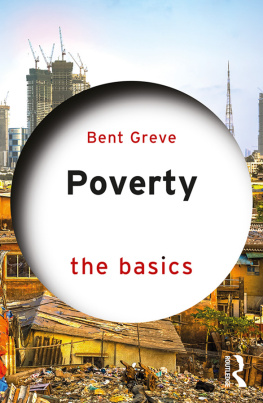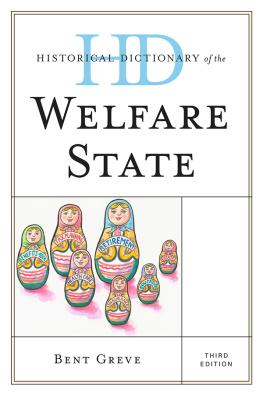
HAPPINESS
Although happiness is based upon individuals subjective perception of their own situation, understanding the concept of happiness is important for forming policies in modern societies. Taking into account discussions from disciplines across the social sciences, this book explores varying notions of happiness and how these are applied to create a theoretical understanding of the concept.
The book then goes on to demonstrate how a general theoretical concept of happiness can be used to add to our knowledge of the central aspects of modern society, ranging from questions related to welfare state analysis to evaluating everyday life for individual people. In doing so, Happiness presents an up-to-date and applied account of how happiness is now widely used in economics, sociology, psychology and political science, while also exploring the relationship between happiness and public policy.
Bent Greve is Professor in Social Science with an emphasis on welfare state analysis at the University of Roskilde, Denmark. His research interest focuses on the welfare state, and social and labour market policy, often from a comparative perspective. He has published extensively on social and labour market policy, social security, tax expenditures, public sector expenditures and financing of the welfare state. He is regional and special issues editor of Social Policy & Administration. Recent books include Choice (2010), Social Policy and Happiness in Europe (2010) and Occupational Welfare (2007).
KEY IDEAS
SERIES EDITOR: PETER HAMILTON, THE OPEN UNIVERSITY, MILTON KEYNES
Designed to complement the successful Key Sociologists, this series covers the main concepts, issues, debates, and controversies in sociology and the social sciences. The series aims to provide authoritative essays on central topics of social science, such as community, power, work, sexuality, inequality, benefits and ideology, class, family, etc. Books adopt a strong individual line, as critical essays rather than literature surveys, offering lively and original treatments of their subject matter. The books will be useful to students and teachers of sociology, political science, economics, psychology, philosophy and geography.
Citizenship
Keith Faulks
Class
Stephen Edgell
Community second edition
Gerard Delanty
Consumption
Robert Bocock
Globalization second edition
Malcolm Waters
Lifestyle
David Chaney
Mass Media
Pierre Sorlin
Moral Panics
Kenneth Thompson
Old Age
John Vincent
Postmodernity
Barry Smart
Racism second edition
Robert Miles and Malcolm Brown
Risk
Deborah Lupton
Social Capital second edition
John Field
Transgression
Chris Jenks
The Virtual
Rob Shields
Culture second edition
Chris Jenks
Human Rights
Anthony Woodiwiss
Childhood second edition
Chris Jenks
Cosmopolitanism
Robert Fine
Social Identity third edition
Richard Jenkins
Nihilism
Bulent Diken
Transnationalism
Steven Vertovec
Sexuality third edition
Jeffrey Weeks
Leisure
Tony Blackshaw
Experts
Nico Stehr and Reiner Grundmann
Happiness
Bent Greve
HAPPINESS
______________
Bent Greve
First published in 2012
by Routledge
2 Park Square, Milton Park, Abingdon, Oxon, OX14 4RN
Simultaneously published in the USA and Canada
by Routledge
711 Third Avenue, New York, NY 10017
Routledge is an imprint of the Taylor & Francis Group, an informa business
2012 Bent Greve
The right of Bent Greve to be identified as author of this work has been asserted by
him in accordance with the Copyright, Designs and Patents Act 1988.
All rights reserved. No part of this book may be reprinted or reproduced or utilised
in any form or by any electronic, mechanical, or other means, now known or
hereafter invented, including photocopying and recording, or in any information
storage or retrieval system, without permission in writing from the publishers.
Trademark notice: Product or corporate names may be trademarks or registered
trademarks, and are used only for identification and explanation without intent to
infringe.
British Library Cataloguing in Publication Data
A catalogue record for this book is available from the British Library
Library of Congress Cataloging in Publication Data
Greve, Bent.
Happiness / Bent Greve.
p. cm. (Key ideas)
1. Happiness. 2. HappinessPhilosophy. 3. HappinessPolitical aspects
4. HappinessSocial aspects 5. Social policy. I. Title.
BF575.H27G74 2012
302.1dc23
2011018291
ISBN: 9780415682930 (hbk)
ISBN: 9780415682947 (pbk)
ISBN: 9780203234471 (ebk)
Typeset in Garamond and Scala
by RefineCatch Limited, Bungay, Suffolk
CONTENTS
LIST OF ILLUSTRATIONS
Boxes
Figures
Tables
PREFACE
Happiness has been and still is central to many societies and individual persons. It has presumably been a goal as long as human societies have existed on the globe. This book tries to pursue the discussion on what happiness is, and also whether we can measure happiness in a reliable way. The book is written from an interdisciplinary approach, embracing especially sociology, economics, psychology and philosophy, given that happiness is not limited to one branch of research and further that the varied perspectives can help in a better understanding of everyday life as well as goals for societal development.
The book argues in favour of a more nuanced way of understanding present-day societies. Happiness is important. However, the striving for happiness thus also implies that we cannot measure society's development from a perspective using economic data such as GDP per capita alone. We need to include measures of well-being and also how the relations between individuals have an impact on people's everyday life and happiness.
This further implies that political decision makers also should look into how they can help in improving the level of happiness for the individual citizen, as this is important for society's development, but presumably also for their effectiveness and ability to develop in a positive way. The relation between modern welfare states, public policy and happiness is therefore open for analysis. Increasingly, countries seem to be interested in measuring and using the concepts of happiness in order to understand development in different societies. Furthermore, decision makers around the world have increasingly become aware that even though money is important other elements are equally important for the quality of life.
Happiness is a contested concept and some still argue that it cannot be used in social science and political decisions. I hope that after reading this book many people will be convinced that although, clearly enough, happiness research cannot provide us with all the knowledge needed, it will add to our understanding of societies and of individuals behaviour. It will also enhance our knowledge of why people do not always react in a rational way and just try to maximize individual utility. Furthermore, happiness is not only an individual quest, but society also has a role in maintaining and improving the level of happiness. Increased happiness might even be a win-win situation for both individuals and societies.












